Times have changed, and it's no longer a "must" for women to take their husband's surname when they get married. But many still choose to do so. In fact, a 2023 survey found that four out of five women in the U.S. legally change their maiden names after tying the knot.
Most of the time, the name changes look good on paper. Some lucky ladies even score a better first-name-last-name combo deal than the one they had before. But that's not always the case. There are a few unfortunate but hilarious circumstances where taking your partner's surname can backfire like a bad joke.
There's a TikTok trend doing the rounds where women answer the question, "Are you excited to have his last name?" and it's leaving people in stitches. From a Millie Waters who'll become Millie Willy, to a Brooke Marshall who'll henceforth be known as Brooke Hornibrook. These girls are all answering, "not really..."
Bored Panda has put together a compilation of the best "baddest" names for you to scroll through while you practice your future married signature. Many might make you thankful that in this here era, it's legal to keep your maiden name. We also delve into why women traditionally took their husband's surname. You'll find that info between the images.
#1

Image credits: milliewaters35
I'm not sure if the kids of today still do it, but back in the '90s, there was this thing where girls would write down their first name alongside their crush's last name - just to see how it looks. And to daydream, of course. They might even take it a step further by creating a signature that they'll one day (hopefully) use after marrying their Prince Charming.
It was a given back then that you'd change your maiden name when you tied the knot. But nowadays, that's not the case. Some women do it, others keep their original surname, and a few do the double-barrel vibe. Then there are those who laugh in the face of patriarchy and let their husbands deal with the admin of a surname change.
But why was it once tradition, and a legal requirement, for women to take on their groom's last name? Apparently, because of something in history called "coverture," and we'll explain that more a bit later...
#2

Image credits: darren_walking_sober
#3

Image credits: beefy.queefy
Whether you choose to drop your maiden name is a personal choice. Choice being the operative word. But most women are still opting to do so, even when they don't have to.
Around 80 percent of women surveyed by the Pew Research Center in 2023 said they took their husband’s last name. Roughly 14 percent kept their birth last name, and only 5 percent chose to hyphenate their last name with their man's.
Even some celebrities, who have literally made a name for themselves with their original surnames, opted to take their husband's last names when they tied the knot. Jennifer Lopes became Jennifer Affleck (though not for long), Hailey Baldwin is now Hailey Bieber, Jessica Biel is Mrs. Timberlake, and Katy Perry (briefly) became Katy Brand.
#4

Image credits: holvictoria11
#5

Image credits: graceratcliffe7
#6

Image credits: sammwatsson
The tradition dates back to the Middle Ages, when what's known as common law came into play. Within this very patriarchal common law was something called coverture.
“Coverture is a legal formation that held that no female person had a legal identity,” explains Catherine Allgor, a historian of women’s lives and gender and president of the Massachusetts Historical Society.
Allgor says that back then, a female baby was covered by her father’s identity, and later, when she was married, by her husband’s. In essence, she became "one" with her husband. But not in the romantic way you might think.
#7

Image credits: mollyy.potter
#8

Image credits: thedvccouple
#9

Image credits: hollzquinz
"The ‘one’ was the husband,” Allgor explains. “She becomes, and this is the phrase, ‘legally dead.’ So it’s not that women take the last names of their husbands, which is how we think of it—it’s that they become part of [the husband’s] body. She does not exist in law, only the husband does.”
The Oxford Reference defines coverture like this: "Formerly, the status of a woman during, and arising out of, marriage. At common law, a wife 'lost' her own personality, which became incorporated into that of her husband, and could only act under his protection and 'cover.'"
#10

Image credits: flick.coates
#11
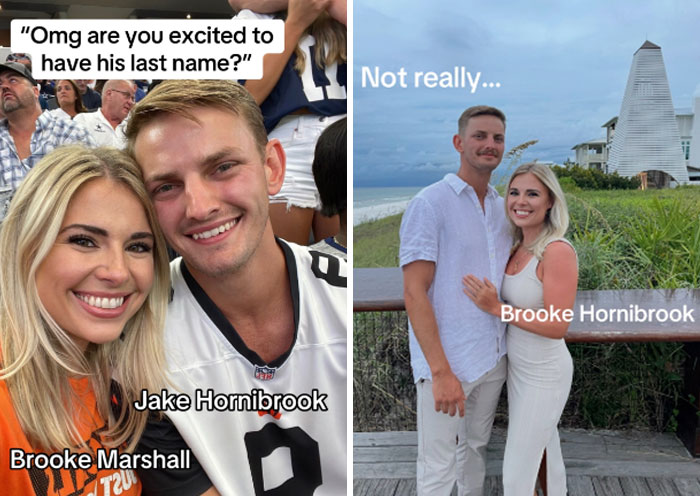
Image credits: brooke.marshall_
#12

Image credits: starlightx
Of course, this means a woman's rights were extremely limited. “Married women could not make contracts, because they couldn’t own businesses,” says Allgor.
Married women owned nothing, she emphasized, not even the clothes on their backs. "They had no rights to their children, and no rights to their bodies, so men could send their wives out to labor, and [the men] could collect the wages. He also had an absolute right to sexual access."
So why then, with all the progress we've made to date, do so many women still willingly take their husband's last name?
#13

Image credits: ronkajuliaa
#14

Image credits: thetilleystobe
#15

Image credits: kaylee88.x
Simon Duncan, a professor in family life at the University of Bradford, UK, has been studying this very thing. His research found that it's all connected to the survival of other patriarchal traditions.
Just like fathers giving away their daughters at a wedding, or men being more likely to propose. The expert says these things have become part of the optimum “marriage package” for many couples.
#16

Image credits: annadelaneyg
#17

Image credits: itslauralarge
#18

Image credits: rebecca.taylorxx
Another reason the tradition has stuck, he says, is because of public perceptions. Taking on a partner’s name is seen as a way to "display your commitment and unity" to the outside world.
That's why Lindsey Evans did it. “I feel like it gives us an identity as a family and not just individuals,” she told the BBC. “We have our own first and middle names, which make us our own people, but having a joint last name makes us more of a unit.”
#19

Image credits: rolymolz
#20

Image credits: laurenlongenecker
#21
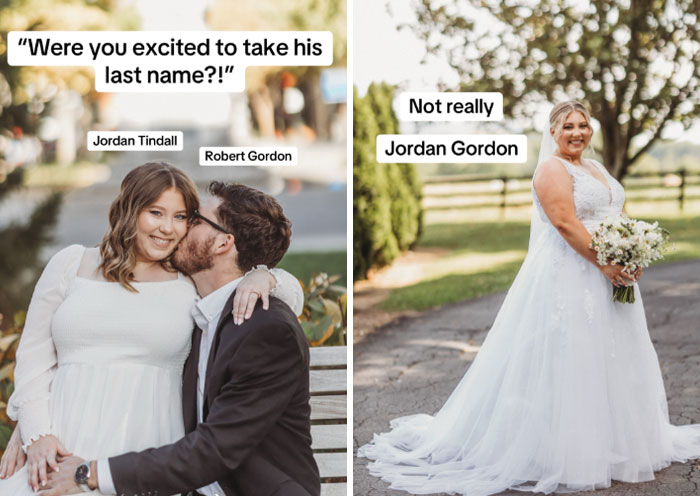
Image credits: jordygordyy
Sometimes, a woman will have more personal reasons to let go of their maiden name. Perhaps they never liked it to begin with, or they want to distance themselves from their family. Maybe they just want a fresh, new identity.
"Another argument is that feminism is ultimately about giving women free choice," reports the BBC. "This means as long as they can decide what name they’d like (rather than it being forced on them by their partner or society), it shouldn’t matter whether that is in keeping with, or going against, patriarchal norms."
#22

Image credits: jordanmckinlay8
#23

Image credits: maddyoversharing
#24
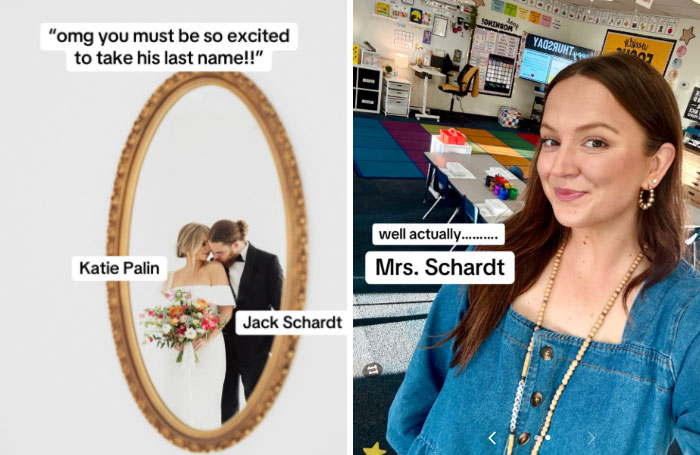
Image credits: katiepalin
Whether or not you choose to change your name when you walk down the aisle is up to you. If you do, we can only hope that your new identity has a great ring to it. And that you don't end up being teased, or trending on TikTok, because while you and your partner are a great match, the same can't be said about your first name and his last.
#25
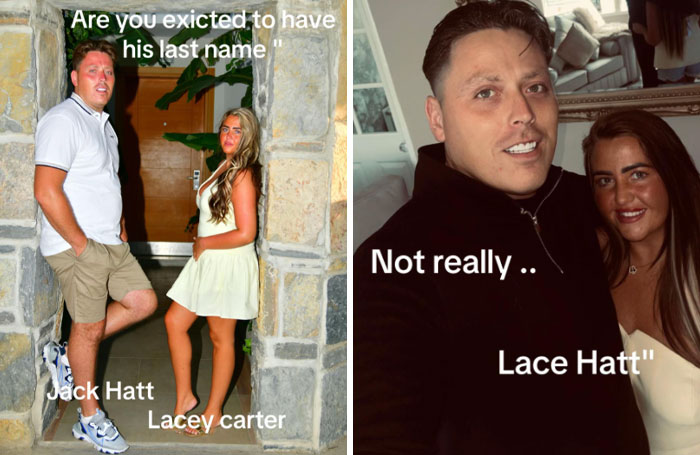
Image credits: lacey_carter3
#26

Image credits: _lebbbbb
#27

Image credits: catrinedwardsx
#28

Image credits: poppyxkearney
#29

Image credits: jaimiekgarner
#30

Image credits: styledbyseanna
#31
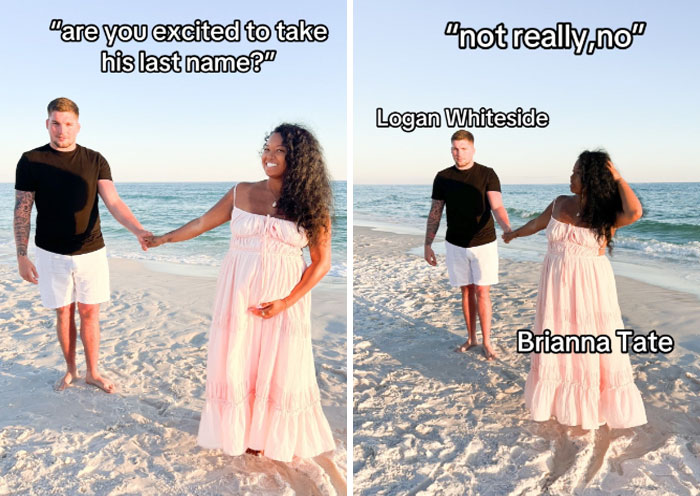
Image credits: bri.irey







